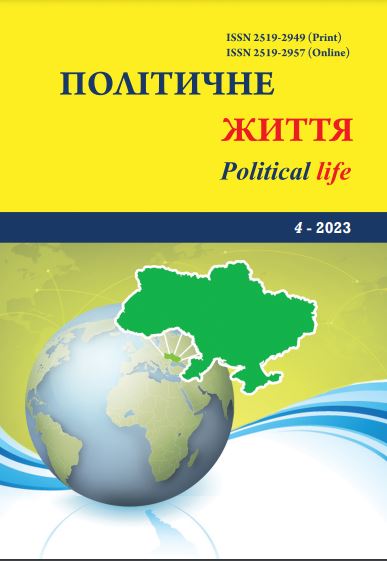The evolution of the doctrine of panturkism and its political significance for Тurkey’s geo-strategy
DOI:
https://doi.org/10.31558/2519-2949.2023.4.23Keywords:
Turkism; pan-Turkism; geostrategy; international politics; ethnopolitics; foreign policy of the Republic of Turkey; ideology of Turkey; cooperation; Ukrainian-Turkish relationsAbstract
Modern processes of globalization in the world, on the one hand, are characterized by intense integrative processes in countries across the globe, which contribute to forming economic unions and developing supranational institutions. On the other hand, there is a rising national self-awareness and a growing role of the ethnic factor in the socio-political development of countries. Ethnic communities, as political subjects, simultaneously have an impact on both domestic and international processes. The study of pan-Turkism is currently of considerable scientific interest due to a new stage in developing the doctrine of unifying all Turkic peoples, and the doctrine’s influence on Turkey’s geopolitics.
Pan-Turkism is a challenge for many countries, as its use is likely to aggravate ethnopolitical relations and feed the centripetal forces of the Turkic-speaking population in multiple countries. The article examines evolution stages of pan-Turkism doctrine in historical retrospect.
It was determined that pan-Turkism today acts as: 1) a multifaceted program of systemic integration of the Republic of Turkey and Turkic-speaking countries in the field of language, culture and education based on the Turkish alphabet, linguistics, history, literature and culture; 2) maximum pragmatism for Turkey’s economy and energy, gaining access to raw resources of friendly Azerbaijan and the Central Asian republics; 3) Ankara’s active diplomatic activity to ensure the interests of friendly Turkic-speaking countries (including the CIS countries) in relations with the West, as well as in the event of conflict situations (for example, during the Armenian-Azerbaijani conflict), as well as promoting Islamic consolidation; 4) formation of integrated various all-Turkic state and non-state institutions
for the purpose of partnership and international cooperation.
References
Ульченко Н. Новый путь Турции? Мировая экономика и международные отношения. 2012. № 6. С. 90-101.
Гумилев Л. Древние тюрки. М. : Айрис-пресс, 2016. 560 с.
Каиржанов А. Тюркология: История всемирной тюркологи : монографія. / под ред. Ш. Ибраев, К. Келимбетов. Алматы : Раритет, 2016. 448 с.
Róna-Tas A. An Introduction to Turkology. Universitats Szegediensis de Attila József nom., 1991. 170 p.
Mansuroğlu, M. Turkish literature through the ages (with bibliography). Central Asiatic Journal, 9(2), 1964. Р. 81–112.
Gurr T. Minorities at Risk: A Global View of Ethnopolitical Conflicts. USA : United States Institute of Peace, 1993. 448 р.
Crawford Y. Nationalism and Separatism in Afrika. / Kilson V. (ed.) New States in the Modern World. Cambridge: Harvard University Press, 1975. Р. 57-75
Tuna М. Imperial Russia’s Muslims: Islam, Empire and European Modernity, 1788–1914. Cambridge University Press, 2017. 290 р.
Узун Ю. Розвиток ідеї тюрко-турецького культурного простору в ХХ столітті та її політичне значення для геотратегії Туреччини. Evropsky politicky a pravni diskurz. 2016. Sv. 3, Vyd. 3. C. 33-44.
Динікова Л. Діяльність Ісмаїла Гаспринського в контексті міжкультурних комунікацій кримськотатарського суспільства в кінці ХІХ – на початку ХХ століття : дис. … канд. культурології : 26.00.01. Київ, 2014. 20 с.
Landau J. Pan-Turkism in Turkey. A Study of Irredentism. London: C. Hurst & Company, 1981. 219 p.
Thomas, David S. "YUSUF AKÇURA’S ÛÇ TARZ-I SIYASET". Central Asian Monuments, Piscataway, NJ, USA: Gorgias Press, 2011, pp. 173-191.
Moaddel M. Islamic Modernism, Nationalism, and Fundamentalism. Episode and Discourse. Chicago : University of Chicago Press, 2005. 448 р.
Taner Akçam. İnsan Hakları ve Ermeni Sorunu.İttihat ve Terakki’den Kurtuluş Savaşı’na. Yayıncı : İmge Kitabevi, 2014. 575 s.
Gökalp, Ziya. Türkçülüğün Esasları. URL: http://www.iskenderiyekutuphanesi. com/2009/10/ziya-gokalp-turkculugun-esaslari/#comments (дата звернення 23.01.2023).
Uzer U. An Intellectual History of Turkish Nationalism: Between Turkish Ethnicity and Islamic Identity. Salt Lake City : University of Utah Press, 2016. 288 p.
Mango А. Ataturk: The Biography of the Founder of Modern Turkey. New York : Abrams Press, 2002. 704 р.
Шюкрю Ганіоглу М. Ататюрк. Біографія мислителя. Київ : Ніка-Центр, 2018. 240 с.
Türkiye Cumhuriyeti Anayasası. URL: https://bianet.org/bianet/siyaset/4485-1982-tc-anayasasi (дата звернення: 30.07.2023).
Aytürk, I. “The Racist Critics of Atatürk and Kemalism, from the 1930s to the 1960s.” Journal of Contemporary History, no.46 (2), 2011. 308–335 р.
Reinkowski М. The History of the Republic of Turkey (Ottoman and Turkish Studies). Academic Studies Press, 2023. 300 р.
Хто такі – Сірі Вовки. URL: https://jak.koshachek.com/articles/hto-taki-siri-vovki.html
(дата звернення: 10.08.2023).
Надеин-Раевский В., Сковорода В. Бизнес без зеленого знамени. Интербизнес. 1992. № 4(22). С. 40
Kurtulus B. Cooperation in the Fields of Education and Science Between Turkey and the Turkish Republics. Eurasian Studies. 2000. № 17. С. 44
Reading Erdogan’s Ambitions in Turkey’s New Mosques. URL: https://www.nytimes.com/2017/06/14/magazine/reading-erdogans-ambitions-in-turkeys-new-mosques.html (дата звернення: 10.08.2023).
Constructing a "New Turkey" through Education URL: https://tr.boell.org/en/2019/10/01/constructing-new-turkey-through-education (дата звернення: 10.08.2023).
“Turkistan will once again be a center of attraction and enlightenment”. URL: https://www.tccb.gov.tr/en/news/542/133471/-turkistan-will-once-again-be-a-center-of-attraction-and-enlightenment-# (дата звернення: 10.08.2023).

